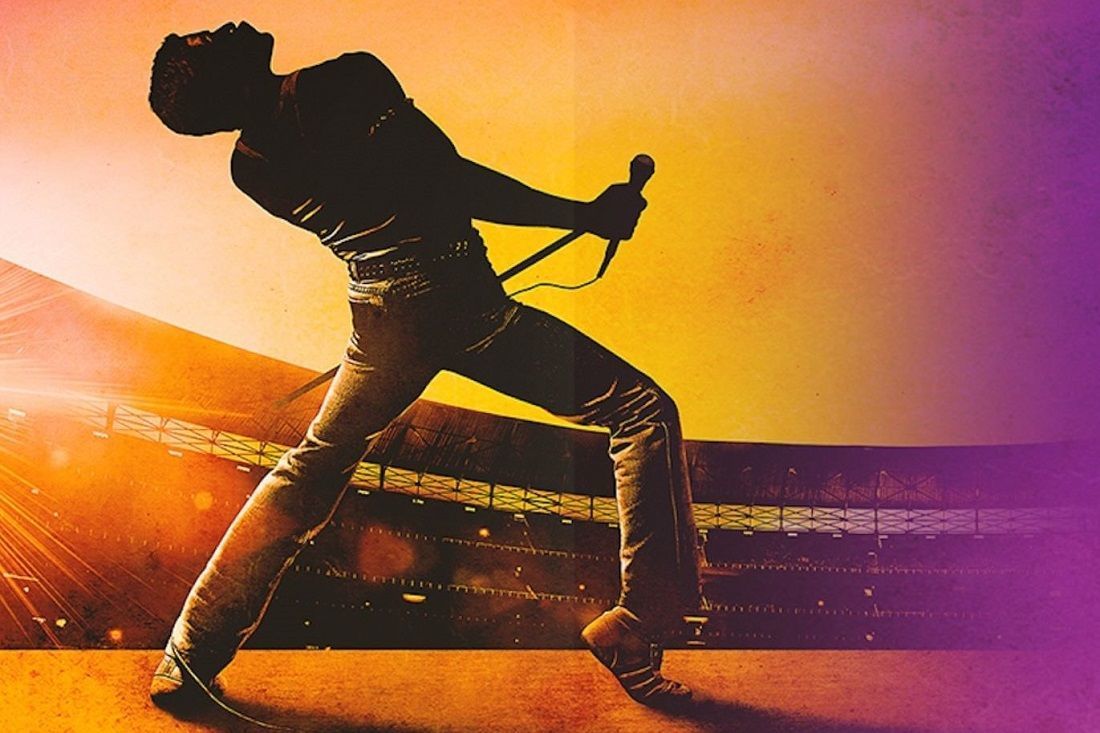Bohemian Rhapsody is not a very subtle movie. In the first moments of Bryan Singer’s Queen bio-drama, we get a montage of preparation for Live Aid, the famous 1985 all-star charity concert. The jorts-clad roadies move equipment, thousands of people make their way into Wembley Stadium, the members of the band wait in their trailer, guitars are tuned, costumes are donned, and Queen’s “Somebody to Love” plays on top of it all. Although we soon cut to fifteen years earlier and will not return to this time for another 90 minutes. The movie has successfully telegraphed to the audience: Live Aid is an important climax of this movie. As I said, not subtle.
Much of this story is well-known, not only because of the popularity of Queen and Freddie Mercury (a Best Actor nominated Rami Malek), but because it is cliché. In 1970, four young British men form a band to rock on their own terms and for a different audience: “We’re four misfits who don’t belong together . . . playing for other misfits,” announces Freddie. Success comes soon, but strife is never far away from dividing Brian May, Roger Taylor, and John Deacon from their enormously talented and provocative singer Freddie Mercury. Despite the heights of fame and the lows of a life lived under a spotlight, the band pulls together for a selfless act of Rock and delivers what is widely considered one of the best live performances of all time. Throw in a soundtrack of Queen’s hits, knowing jokes for an audience raised on these lyrics, a cameo by Mike Myers (famously Queen-obsessed in Wayne’s World), recording montages, touring montages, Freddie’s costumes montages, and an outsized set of dental prostheses for Malek and you have Bohemian Rhapsody.
Indulge me for a moment, though, and return to the opening seconds of the film. Before any music starts, the shot lingers on one open eye of a mustachioed man, head on his pillow, face drawn, weary. He sits up and coughs, head hanging low. Extend your indulgence further, and hear my (purely speculative) opinion: within Bohemian Rhapsody is a hypothetical movie, that one could extract and expand upon, titled (I’d like to think) Somebody to Love. This movie would strip away most of the repetitive tropes, the too-obvious lines, and the pastiche of Rock-god bravura (most and not all: some of it is quite fun). This movie (partially realized here) would tell the story of Freddie Mercury, a uniquely gifted singer, ambitious for fame, troubled by his latent homosexuality, and struggling to find something to like in himself. This movie would be about friendship and real love, not its simulacra from adoring fans or from those whose own hurt makes them use and abuse people. Sure, this story is nothing groundbreakingly original, but it is one that resonates with the common human need for relationship, of the love that one can give when one knows that they are themselves loved.
Freddie Mercury is a man in conflict: infatuated and (in some sort of) love with Mary Austin (Lucy Boynton), he struggles with his sexuality. From a traditional Parsi family, he struggles with the decision to pursue fame at the expense of alienating his parents. As Queen becomes more and more successful, Freddie’s outsized personality struggles against the checks on it necessary for creative collaboration with his bandmates. There is a darkness in Freddie’s life that keeps creeping in and cannot be stopped with distractions.
Throw into this maelstrom Paul Prenter (Allen Leech), a part of Queen’s management team who soon ingratiates himself into Freddie’s life. “I know what it is like not to belong,” Paul say, himself “a queer Catholic boy from Belfast.” Paul invites Freddie to indulge in his misery, to share in a common animus against those who have kept them down. For moments, Freddie can forget about the emptiness inside with another and powerful distraction. The audience quickly sees that Paul is using Freddie, manipulating his pain and power to fill the void in his own life, keeping Freddie docilely dwindling down into a lower and lower hell of partying, promiscuity, drugs, drink, and despair.
Finally, though, it is a word of love that Freddie hears when he is at his lowest. In a scene at once over the top and sincerely moving, Mary reminds Freddie that there are those who love him, not for anything that he has done, not for any fame or money he has, but for who he is. This realization that he is loved gives Freddie courage to cast off Paul, whom he refers to as a “fruit fly”—someone who has fed off of Freddie’s own sense of rottenness. He returns to the band, honest about his past mistakes, and is welcomed with open arms. Finding now that he actually likes something about himself (that he is loved), Freddie introduces Jim Hutton (who would become Mercury’s companion until the singer’s 1991 AIDS-related death, played by Aaron McCusker) to his parents before Live Aid. Malek speaks the truest words of the film, and ones that demonstrate its heart: “He’s my friend.”
Bohemian Rhapsody (the film we get) more often than not opts for the sparks with no flame and the built-up, directionless emotion of a rock concert rather than the moments of clarity, well-expressed lyric, and human pathos that occasionally occur. In this way, the movie is something like Queen: a talented leading man (Mercury himself, Malek as Mercury) and a band who can rouse millions to sing along the problematic “No time for losers, ‘cause we are the champions!” can also give voice to waking each morning and dying a bit, desiring “someone to love.” Like Malek’s nearly flawless physical impression of Mercury, the film shows Queen mostly as we, the public, have seen them (including a full shot-by-shot Live Aid performance). In a few moments, however, we see an oft-told and worth repeating story of the virtue of friendship.
Editorial Statement: In anticipation of the 91st Academy Awards on February 24, we present a series (click here) exploring the philosophical and theological elements in each of the eight films nominated for Best Picture. We hope to convey through this series that, awards politics and Hollywood scandals aside, films are an art form, and art matters to the Christian life. It allows us to locate the narratives we see onscreen—along with the narratives of our own lives—within the context of the narrative of salvation history, of God’s love poured forth in the life, death, and resurrection of Jesus Christ.

